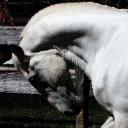Yahoo Answers is shutting down on May 4th, 2021 (Eastern Time) and beginning April 20th, 2021 (Eastern Time) the Yahoo Answers website will be in read-only mode. There will be no changes to other Yahoo properties or services, or your Yahoo account. You can find more information about the Yahoo Answers shutdown and how to download your data on this help page.
Trending News
Horses and Epsom Salt?
My wife's horse has an abscess in his hoof. She mixed up some epsom salt to soak the hoof. While she was getting the hoof cleaned up, she left it outside the stall door.
One of the other horses was being mucked out, got out of his stall, and drank some of it. He probably got somewhat less than a litre. He has a reputation for eating and drinking everything.
Now, I never considered it dangerous. I checked the package, and all it says is "Not recommended for oral use".
I am just wondering if anyone has ever had any bad experiences with this, or has any comment. I do not see any adverse reaction, some hours after the incident. I do not expect to see anything.
Please, we know the stuff should not have been where the horse could reach it. We are not that dumb. It was inadvertent. I am just curious if anyone has had experience with a horse or any other animal drinking epsom salt.
By the way, the abscess popped.
8 Answers
- gallopLv 71 decade agoFavorite Answer
Toxicity will lead to extreme muscle weakness. The heart muscle function is at risk as well, so if you observe signs of weakness of the skeletal muscles there is concern. Magnesium sulfate is what Epsom salts are. Excessive magnesium in blood (hypermagnesemia) is the term referencing an overload. Depending on how much was ingested and how well the horse's kidneys function, the horse may or may not be at risk of serious toxicity. Some passes in stools, but whatever gets absorbed into the blood from the GI tract has to be excreted by the kidneys, and the kidneys are often responsible for excreting most of it. If the horse has good kidney function, then the excess is likely to just be excreted in the urine without any serious toxic effects. Just keep an eye on the horse for any signs of muscular weakness or abnormal behavior, and be sure you offer plenty of fresh water to allow the kidneys to form urine to get rid of it.
Add.............. here is a human case of hypermagnesemia associated with administration of an Epsom salts enema to a child as a typically dangerous and misguided homeopathic "treatment". I couldn't find a good equine case to post, but this gives you an idea of the potential toxic effects when it is absorbed from the GI tract................
Source(s): Registered Nurse and 58 years with horses - christineLv 61 decade ago
The worst that's going to happen is your horse is going to get the runs and possibly get dehydrated. Epsom Salts is a powerful laxative.
I have actually been recommended to feed a small amount of Epsom Salts to a colicing horse to try and get the bowels moving.
It probably won't hurt- just make sure you keep a close eye on the horse. Every few hours, do the 'pinch' test.
Pinch a small amount of skin on the horses neck and pull it up- the skin should be springy and fall back into place in less than a second. If the skin is loose and not springing back, then your horse is dehydrated.
That's about all I can say!
- ZiggyLv 61 decade ago
While it is not recommended, it is not going to do serious harm as a once off.
You can actually mix up 1kg of Epsom salts and administer as a oral drench. This is intended to completely flush the horses system in extreme cases. It aids to rid the horse of toxins.
I discussed this treatment option recently with my vet. It can cause some system damage (organs), but we were literally talking about putting a horse down, so the negatives were worth the risk in my opinion. The horse is still alive and doing well.
So it will give the horse very loose bowel movements in high doses. It depends on how diluted the water mix was. Epsom Salts are a form of magnesium.
But in general your horse will be fine with a diluted small amount.
Cheeky horse, I bet it did not taste nice ;-)
Well done with the abscess.
Source(s): 33 years riding/owner - How do you think about the answers? You can sign in to vote the answer.
- ?Lv 45 years ago
There are any number of conditions that could be causing your mare's problem, Mariah. She could have been trimmed too short, she could have a "gravel" ( which is a kind of abscess caused by the presence of a particle of dirt or sand that works its way deep into the horse's foot, causing pain and infection) or she could simply have a bruised hoof from either stepping on something sharp or just from standing around stomping flies in the summer heat. My mare's got a bruise right now on her left fore from that, in fact. The ground here is like concrete, because we're in the middle of a drought. When the mare is turned out, all she and her herdmates do is stand around in the shade and stomp flies. She's got shoes on, but that hasn't really prevented this. About the only thing I can do for her right now is keep her on a low dose of bute every now and then, and soak her when I get a chance. Once the weather breaks ( and it will, sooner or later) then this won't be a problem because her hooves will soften up. What you need to do is have your mare evaluated by a vet and find out what's really going on- if it is a bruise, an abscess, a gravel, or what. The mare could also have an infection that's causing her problem too, such as Lyme Disease. One of our other horses had that problem a few years ago, and while he was never lame, his energy level was really low and his appetite was way off for a while. Once they did a titer and found out he was sick, though, we got him on antibiotics and he recovered in a hurry. If your mare's got a bruised foot or an abscess, then yeah, soaking will help her. But you don't want to be doing that if she's got something like a quarter crack or white line disease, because you will only make the problem worse. So my advice is the same as Gallop's- get the vet out there and have her checked, so you know what the heck is going on. You don't want to be wasting your time and money doing something that isn't going to help, either, for obvious reasons. Good luck.
- Karin CLv 71 decade ago
Epsom salts taken internally are used as a laxative.
Given the amount your horse drank, the only thing I would do, if I were you, is not stand behind him for a while.
- 5 years ago
I have a founder horse well I am careing for on. He feet are in the moud all the time. I clean them but can I sokundre foot in salt.?
- Anonymous7 years ago
Hi there,
I definitely recommend to use a good betting software if you want to achieve consistent results. I use the software of this site http://www.goobypls.com/r/rd.asp?gid=567
With this new software you are able to automate the process of picking selections, as well as create your own version of the system by tweaking the filters
Cheers.







